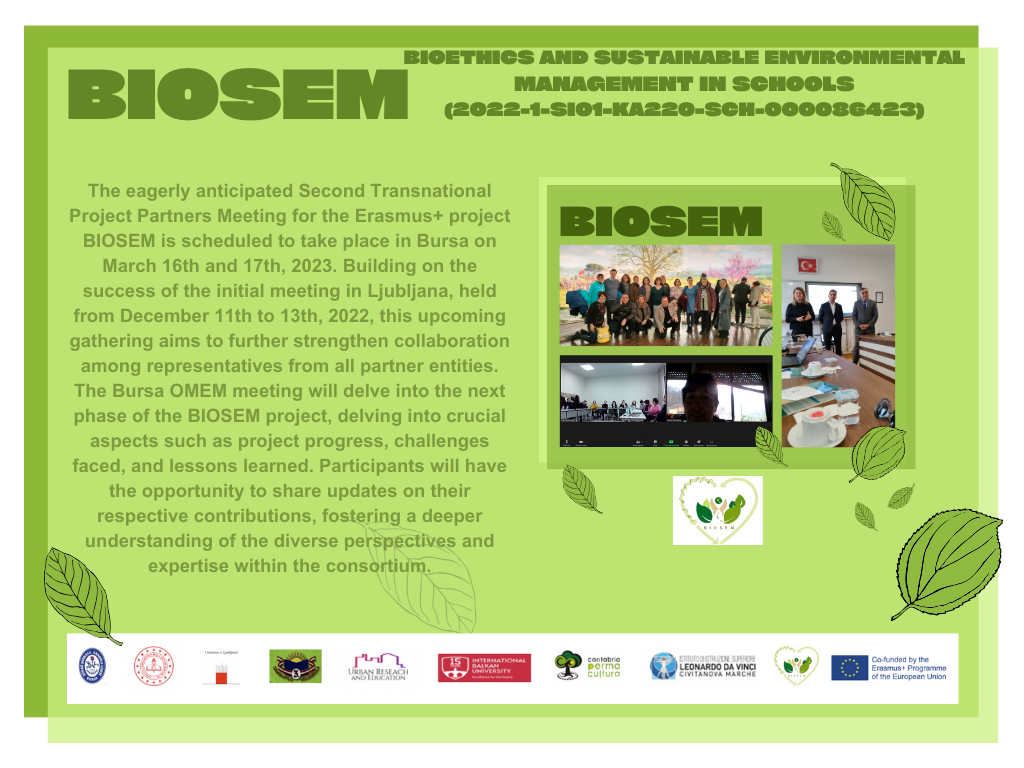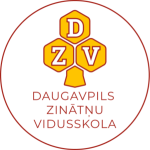BIOSEM
PROJECT DETAILS
In today’s world, due to excessive consumption, new solutions have been sought in consequence of the increase in waste as well as the depletion of resources. It is thought that consumption habits should be reviewed with the increase in population. In this context, these circumstances make people refer to sustainability in consumption and nutrition as well as a minimalist lifestyle. Bioethics examines the ethical problems that arise in the expanding network of relations from all living beings to the ecosystem. Another concept closely related to bioethics is environmental ethics which is defined as «the systematic examination of ethical relations between people and the natural environment». The ethical relationship with life forms and all environmental elements including them is explained by the concept of environmental bioethics. Everything related to the environment that affects life falls within the scope of environmental bioethics (Gazi and Çobanoğlu, 2016). On the other hand, bioethics education enables individuals to comprehend the value problems caused by biological sciences and to develop their decision-making skills based on ethical theory and principles (Macer, Asada, Tsuzuki, Akiyama ve Macer, 1996; Reich, 1995). Bioethics education is based on the principle of developing discussion and decision-making skills by ensuring that students have the scientific background to discuss issues causing ethical debates. In addition to the scientific background, educated individuals need the discussions they have with their peers and the skills to evaluate personal and social issues and put forward their opinions (Sadler & Donnelly, 2006). A study conducted in England and Taiwan showed that students studying the basic principles of biotechnology participated in their activities and had the opportunity to discuss ethical issues more in the UK, so had a more positive attitude than the students in Taiwan where they only had theory but no implementation (Chen & Raffan, 1999). Sustainable consumption is the wise use of natural resources without endangering the needs of future generations by minimizing the emissions of waste and toxic substances. It is thought that sustainable consumption and rearrangement of consumption in all areas of life will be beneficial in terms of solving environmental problems. Also, a minimalist lifestyle will provide partial solutions to environmental problems. The course bioethics should be compulsory for all young people as it is at the core of education about sustainability. It raises students’ awareness in the controversial debates of biological sciences and develops their decision-making skills without moving away from science and ethical principles (Yaman, 2011). The BIOSEM project also complies with the objectives of the HELSINKI DECLARATION, of which the main purpose is to reduce the deepening gap between science and human beings. In short, being aware of ethical problems is the basic principle of offering solutions.
By addressing these topics, the following project activities are planned:
1. Knowledge and competency framework for Bioethics in high school (Identification of learning outcomes for high school bioethics education)
2. Creating interdisciplinary case/scenario-based course content
3. Elective Course
4. e-learning module on bioethics and sustainable environment (for teachers)
5. Online pool of good practices on bioethics and sustainable environment
With the BIOSEM project, we want to increase the awareness of high school students about bioethics and sustainable environment, to adopt the principles of bioethics in their daily lives while practicing their profession, their consumption habits for a sustainable environment, their perspectives on living things, and that all living things are a part of the natural cycle. For this purpose, educational materials related to this subject will be developed in high schools.
Also, in the meeting held with the partners in order to increase the awareness of students, it was decided to consider the following topics in the project:
- Globalisation
- Climate change
- Human development
- Ecosystem health
- Minimalist living
- Water resources
- Recycling
The purpose of environmental education is to teach and educate the public about the function of natural environments and, in particular, people’s behaviour and how they can manage their ecosystems.
It is the education that establishes the foundations of a sustainable environment. It is stated that environmental education focuses on sustainability, knowledge, attitudes and skills of individuals, in which environmental information expresses knowledge and awareness about problems and their solutions.
While the National Academy report predicts that the 2020 Engineer can lead ethics and sustainability, researchers have consistently used different approaches to understand and improve how teaching ethics and sustainability together can improve student outcomes, keeping in mind teaching ethical reasoning skills for sustainability.
There are various studies on bioethics as a part of master’s theses or academic studies. However, it is above what a single educational institution can do to prepare education-teaching methods and educational materials that include the education of students between the ages of 15-18 in the field of practical application and the international platform. Therefore, education and training materials on sustainable environment and bioethics that will emerge with this project will be used in high schools in Europe and the importance of high school bioethics education will be increased. This way, students will acquire the expected objectives.
The inclusion of the younger generation in environmental education will help them become green participants, taking into account the influence and impact of the followings:
* They will pay attention to the impact of life sciences, including genetics, on future generations
* As new citizens, they will take over the responsibility of protecting the environment;
* They will be trained in and for the environment to be able to educate others about the environment.
To measure the impact on the target group: Qualitative and quantitative data analysis methods will be used to measure effects. Measuring Impact on Target Audience Responsible: University of Ljubljana, IBU, URE After project results, it is expected that their knowledge, skills and attitudes about bioethics and sustainable environment will increase. For this The SUSTAINABLE ENVIRONMENTAL EDUCATION ATTITUDE SCALE (29 items) test will be used. The test was prepared during the project writing phase and added to the Annex.
In order to measure the readiness levels of the students, the SUSTAINABLE ENVIRONMENTAL EDUCATION ATTITUDE SCALE will be applied by selecting at least 200 students from each school.
The Self-Assessment Tool includes knowledge, skills and attitude questions. Questions are given in the Annex. The environmental attitude scale to be applied to the students at the beginning and end of the project is aimed to show a 40% difference.
PROJECT ACTIVITIES
AGENDA OF THE PROJECT PARTNER MEETING IN LATVIA
NEWSLETTER N1
NEWSLETTER N2
NEWSLETTER N3
NEWSLETTER N4
NEWSLETTER N5
KNOWLEDGE AND COMPETENCY FRAMEWORK
KNOWLEDGE AND COMPETENCY FRAMEWORK_ENGLISH VERSION
KNOWLEDGE AND COMPETENCY FRAMEWORK_GERMAN VERSION
KNOWLEDGE AND COMPETENCY FRAMEWORK_LATVIAN VERSION
KNOWLEDGE AND COMPETENCY FRAMEWORK_SPANISH VERSION
KNOWLEDGE AND COMPETENCY FRAMEWORK_ALBANIAN VERSION
KNOWLEDGE AND COMPETENCY FRAMEWORK_SLOVENIAN VERSION
KNOWLEDGE AND COMPETENCY FRAMEWORK_TURKISH VERSION
KNOWLEDGE AND COMPETENCY FRAMEWORK_ITALIAN VERSION
SCENARIOS
SCENARIOS_ENGLISH VERSION
SCENARIOS_GERMAN VERSION
SCENARIOS_LATVIAN VERSION
SCENARIOS_SPANISH VERSION
SCENARIOS_ALBANIAN VERSION
SCENARIOS_SLOVENIAN VERSION
SCENARIOS_TURKISH VERSION
SCENARIOS_ITALIAN VERSION













